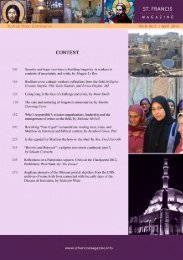download the pdf - St.Francis Magazine
download the pdf - St.Francis Magazine
download the pdf - St.Francis Magazine
You also want an ePaper? Increase the reach of your titles
YUMPU automatically turns print PDFs into web optimized ePapers that Google loves.
<strong>St</strong> <strong>Francis</strong> <strong>Magazine</strong> Vol 8, No 4 | August 2012<br />
remain in <strong>the</strong> old social identity of ummah. 95 These two options,<br />
Christ’s community vs. <strong>the</strong> Muslim community, are <strong>the</strong>n pitched<br />
against each o<strong>the</strong>r in stark dichotomy.<br />
Theologically it is helpful to contrast ekklesia and ummah, as Chris<br />
Flint has done in a carefully-researched masters’ dissertation. 96 Yet<br />
this is not and cannot be <strong>the</strong> whole story. In real life, including real<br />
life in <strong>the</strong> New Testament era, nearly all converts have to relate to<br />
<strong>the</strong> “world” as well as to <strong>the</strong> “church”. Only cults completely sequester<br />
<strong>the</strong>ir converts from wider society, but this is not <strong>the</strong> picture<br />
we find in Acts and <strong>the</strong> Epistles.<br />
Therefore even in terms of biblical <strong>the</strong>ology, let alone sociology,<br />
it is reductionist to insist that believers must opt for only one social<br />
identity. For “witness” is <strong>the</strong> church’s witness in <strong>the</strong> world. Without<br />
<strong>the</strong> community of believers <strong>the</strong>re can be no witness. But without believers’<br />
involvement in <strong>the</strong> world <strong>the</strong>re can be no witness ei<strong>the</strong>r.<br />
Witnessing Christians, and especially first generation witnessing<br />
Christians, inevitably have a dual social identity. They did in <strong>the</strong><br />
early church and <strong>the</strong>y do today.<br />
Thus converts who continue to relate to <strong>the</strong>ir Muslim friends and<br />
family are not in principle different from converts who continue to<br />
relate to <strong>the</strong>ir Hindu, a<strong>the</strong>ist or postmodern friends and family. However,<br />
<strong>the</strong> extent to which dual belonging proves straightforward or<br />
problematic depends on a number of factors, including two in particular.<br />
The first is <strong>the</strong> degree to which ei<strong>the</strong>r social group tolerates an<br />
individual belonging to <strong>the</strong> o<strong>the</strong>r group at <strong>the</strong> same time, and this<br />
varies a good deal from place to place in <strong>the</strong> Muslim world. The second<br />
factor is <strong>the</strong> extent to which <strong>the</strong> two social identities make conflicting<br />
claims on a person’s loyalty at <strong>the</strong> core worldview level; here<br />
again membership of <strong>the</strong> ummah demands more in some contexts<br />
than it does in o<strong>the</strong>rs.<br />
95 meaning broadly, “local and global church” and “worldwide Muslim community”<br />
respectively.<br />
96 Chris Flint, ‘A Comparison of a Christian View of Ekklesia and a Muslim View of<br />
<strong>the</strong> Mosque as part of <strong>the</strong> Ummah and an Analysis of <strong>the</strong> Missiological Implications<br />
of <strong>the</strong>se Views’, Saint <strong>Francis</strong> <strong>Magazine</strong>, June 2012<br />
<strong>St</strong> <strong>Francis</strong> <strong>Magazine</strong> is a publication of Interserve and Arab Vision 555







![Reflections on Surah Fatiha and the Lord's Prayer[1] - St.Francis ...](https://img.yumpu.com/49377951/1/184x260/reflections-on-surah-fatiha-and-the-lords-prayer1-stfrancis-.jpg?quality=85)









